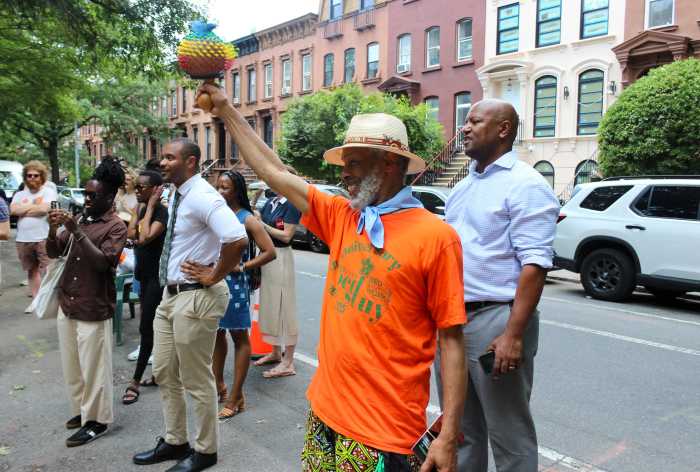An asbestos investigator with a record of violations has been charged
by the city with understating the presence of toxins on a waterfront site
in Red Hook where home-furnishings giant Ikea plans to build a megastore.
The city Department of Environmental Protection (DEP) charges that Thomas
Parisi, who was licensed by the agency to perform asbestos investigations,
misrepresented the quantity and nature of asbestos on the site. Parisi’s
certification led to the issuance of a building demolition permit.
“We claim that he failed to adequately test and adequately state
the asbestos situation in the building,” said DEP spokesman Ian Michaels.
“It’s our contention that he also failed to collect bulk samples
of the building materials,” said Michaels, based on asbestos found
by a DEP inspector following complaints to the agency last December.
The U.S. Dredging Corporation, which currently owns the property at Beard
and Otsego streets, has been contracted by Ikea to carry out the demolition
of an existing Civil War-era pump house and adjacent warehouses that sit
on the property, U.S. Dredging’s environmental lawyer said this week.
The property is part of an assemblage at the former New York Shipyard
upon which Ikea will build a 346,000-square-foot store between Dwight
and Columbia streets along the Erie Basin. The development will also include
more than 70,000 square feet of additional retail and restaurant space
along the waterfront and a public esplanade.
The proposal has divided the neighborhood into two camps — those
concerned about jobs and those who fear Ikea traffic will overrun the
relatively quiet neighborhood and who believe that better uses could be
found for the valuable waterfront property.
The demolition started in December, but on Jan. 7, the DEP issued a stop-work
order halting the demolition when an investigator found large amounts
of asbestos in the rubble.
Parisi’s asbestos inspection report — filed with the DEP on
behalf of U.S. Dredging — certified that the building had significantly
less asbestos than was discovered. The investigator faces up to a $1,200
fine for the infraction.
His was one of among 18 violations served to U.S. Dredging contractors
after the DEP investigation.
Both the agent and the contractors face fines for exposure of what a DEP
inspector later determined to be large amounts of asbestos found in roofing
tiles, that could potentially total $86,400 in penalties.
A lawyer for U.S. Dredging, Philip Karmel, said his client is not guilty
of violations issued for improperly reporting and containing the asbestos
on the site prior to, and during demolition since the company did not
directly hire the investigator.
As for Parisi, the lawyer said, “I’ve never talked to Mr. Parisi
in my life. He was hired by the demolition company.”
Parisi could not be reached for comment.
Michaels said that Parisi has been issued 11 violations since last September.
Five of those were the result of a random audit by the DEP, during which
agents found he had not kept proper paperwork on his clients or was missing
complete evidence of his investigations.
Five other violations were issued this year for various sites around Manhattan
relating to undocumented asbestos.
At an April 25 meeting of the Community Board 6 Public Safety and Environmental
Protection committee, DEP public affairs officer Lillie Zeigler Farrell
told committee members that although the DEP did find high levels of asbestos
on the Ikea site, their role in future investigations was limited to issuing
fines and responding to complaints made to the city’s 311 telephone
system.
“Fines from the DEP may not be the sufficient motivation for something
to stop construction,” said Devin Cohen, the committee chair.
Farrell agreed, and said that quite often contractors factor them into
a project’s budget.
“Does the DEP have the authority to stop demolition at that site,
for example, pending judgment [on the fines] can they halt further demolition?”
asked Cohen.
“If it’s an ongoing public safety issue, then we can stop it
— we call it sealing the site,” said Farrell.
Pauline Blake, first vice chair of CB6, wanted to know what that required.
“Can you go in and seal that site simply because the possibility
exists?”
“Well, we would make sure they’d follow proper procedure to
remove the asbestos,” Farrell responded.
“I’m confused,” said CB6 Chairman Jerry Armer. “Can
you go in and stop it, or do you have to wait until the removal is being
done incorrectly?”
“We work more towards ensuring it is being done correctly,”
said Farrell. “The removal procedure requires papers to be filed
with the DEP,” said Farrell, 10 days prior to any demolition.
But Parisi, Armer pointed out, had failed to file any papers notifying
the DEP of asbestos.
“So if the contractor files the paperwork after the work’s been
done, how will you know?” asked Armer.
“Seeing this is a trouble spot,” Farrell said, “I guess
we’ll know to look out.”
“If they haven’t filed can you just walk in and look at the
building?” asked Armer.
“What would prompt us to do that?” she asked.
Dan Wiley, community liaison for Rep. Nydia Velazquez, pointed out that
the demolished building at 1 Beard St. was only one of an attached compound,
all built in the same year, by the same architect, and most likely of
the same materials, to be used for the same purpose.
“Going into one building is the same as going into another building,”
he said.
“Oh,” said Farrell.
Someone else asked if a company’s cost of compliance with city codes,
including the delay in getting permits, might be more expensive than the
cost of the fines issued by the DEP.
“That does happen a lot, and a lot of developers just build it into
the costs of construction,” Farrell acknowledged.
“Was the investigator dismissed or replaced?” asked Lou Sones,
a board member from Red Hook who is a leader of the Ikea opposition.
Farrell said he was not.
A DEP spokesman later told The Brooklyn Papers that because the investigator
was not hired by the DEP, the most the city could do was revoke his certification.
“Somebody for whom a pattern is established as not doing their job
properly could potentially be subject to a license revocation hearing,”
said Ian Michaels.
Yet according to Karmel, because “the project did not contain friable
asbestos, [U.S. Dredging is] not subject to asbestos regulations.”
Friable asbestos is the kind most commonly attributed to health risks,
as it can break and pieces generate a dust that can be inhaled or ingested,
or can contaminate the surrounding air, water or soil.
The DEP disagrees. “If you remove it illegally, you remove it illegally,”
said Michaels. “The rules are very clear that you have to file a
report with the DEP, and must follow the exact procedure you have to use
to remove the asbestos, to store it, to transport and dispose of it.
“And when our inspector was at the site he clearly saw material scattered
about the ground,” Michaels noted.
Lou Sones, a member of the CB6 public safety committee pressed Farrell
to commit to a full inspection of the buildings on the site prior to allowing
any further demolition.
His request was later turned into a committee motion that passed unanimously,
asking the DEP to conduct a full site investigation.
The DEP currently has no such plans.
“There are no plans for that,” said Michaels. “We simply
don’t have the resources to do that, and as far as I know that’s
never really been done in the past — ever.” Michaels said the
DEP had contacted the city Department of Buildings and put a “red
flag” on U.S. Dredging and the Ikea site’s address for every
time they file an application.
“We are asking them to immediately bring that to our attention, and
our environment people are going to heavily scrutinize that application.
“We are aware these people have messed up once and we’re going
to be very careful about it should it come around again,” Michaels
said.
But at the meeting, Farrell suggested a bribery investigation might be
underway.
“I think, maybe, [Parisi] was offered money,” she told The Brooklyn
Papers. “We’re really going to have to throw the book at him.”
Asked if either Ikea or U.S. Dredging paid Parisi to omit samples from
his reports, Karmel said his client had done nothing wrong.
“We didn’t pay off anyone,” he said.
Ikea spokesman Jamie Van Bramer did not return calls seeking comment.






















